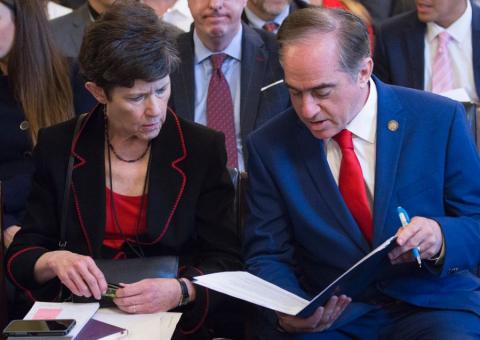On Tuesday Oct. 24, VA Secretary David Shulkin and several veterans’ service organizations took the fight for VA health care reform to Congress. Shulkin argued against a House plan that they say is too restrictive and would compromise patient care.
At a hearing in front of the House Committee of Veterans Affairs, Shulkin and representatives from Disabled American Veterans, the Veterans of Foreign Wars and the American Legion made their case for overhauling the Veteran’s Choice program, which has been plagued with problems since its inception.
At the heart of the discussions is the huge cost of the Veteran’s Choice program. Started in 2014 in the wake of the Phoenix VA wait time scandal, the program has already racked up a bill of more than $12 billion dollars and has been plagued with money mismanagement and issues with timely payments to private-sector providers.
The high costs associated with Veteran’s Choice prompted Congress to approve $2.1 billion in emergency funding in August. This was originally expected to last through February 2018, but now is forecasted to run out by the end of this year.
While those on both sides of the political aisle agree that Veteran’s Choice needs to be reformed, one of the major sticking points is veteran eligibility. The House plan would reverse the positive gains seen with Veteran’s Choice by requiring veterans to be seen at VA facilities unless it is determined that the VA can’t provide them with health care. Shulkin’s plan, called the Veterans Coordinated Access and Rewarding Experiences (CARE) Act, would allow more veterans access to private sector providers.
As the program operates currently, a veteran must be facing at least a 30 day wait or live more than 40 miles from the closest VA health care facility. Veteran’s service organizations and conservative groups want to see this eliminated under the new reforms. Those on the left, including the American Federation of Government Employees, a union that represents approximately 230, 000 VA workers, says that eliminating the “30 day/40 mile” rule would completely undermine the entire VA health care system, and lead to complete privatization.
Coupled within the reforms, is a request to expedite the hiring process to fill the more than 34,000 vacancies within the VA health care system. At the hearing, Sec. Shulkin used mental health care as an example of the ongoing personnel crisis.
The department set a goal of hiring 1,000 new employees in the mental health care field. It has hired 900, but has lost 945 in the same time period, meaning that in reality, the department actually had a net loss of manpower in this department. This problem is rampant throughout the department.
“We went backwards,” Shulkin said at the hearing.
Shulkin also asked that the department be able to address pay gaps between the private sector and VA health facilities, citing pay for nurses, which he says is 20-30 percent less within the VA than it is in the private sector.
“Just put it in the bill,” Shulkin added.
Shulkin and the House bills did agree on a number of points, but according to Chairman Rep. Phil Roe, R-Tenn., the administration’s bill was “light on details." Neither of the plans for reform presented at the hearing included estimates of how much they would cost in the long run, however Shulkin did say that he would funnel money from other areas of the VA to help offset costs, because he believed in the long run, the CARE act would save the department money.
After the hearing, Shulkin said, “There is a great deal of alignment, I couldn’t be happier with the way this is working.”
If the VA secretary gets his way, he says he would need another $4 billion to fund the Veteran’s Choice program through the end of September of 2018 in order to transition to the new program.
It is unclear when either piece of legislation would be officially introduced, but because the emergency funding is expected to run out by the end of the year, Shulkin is asking that Congress pass reform by mid-November.
